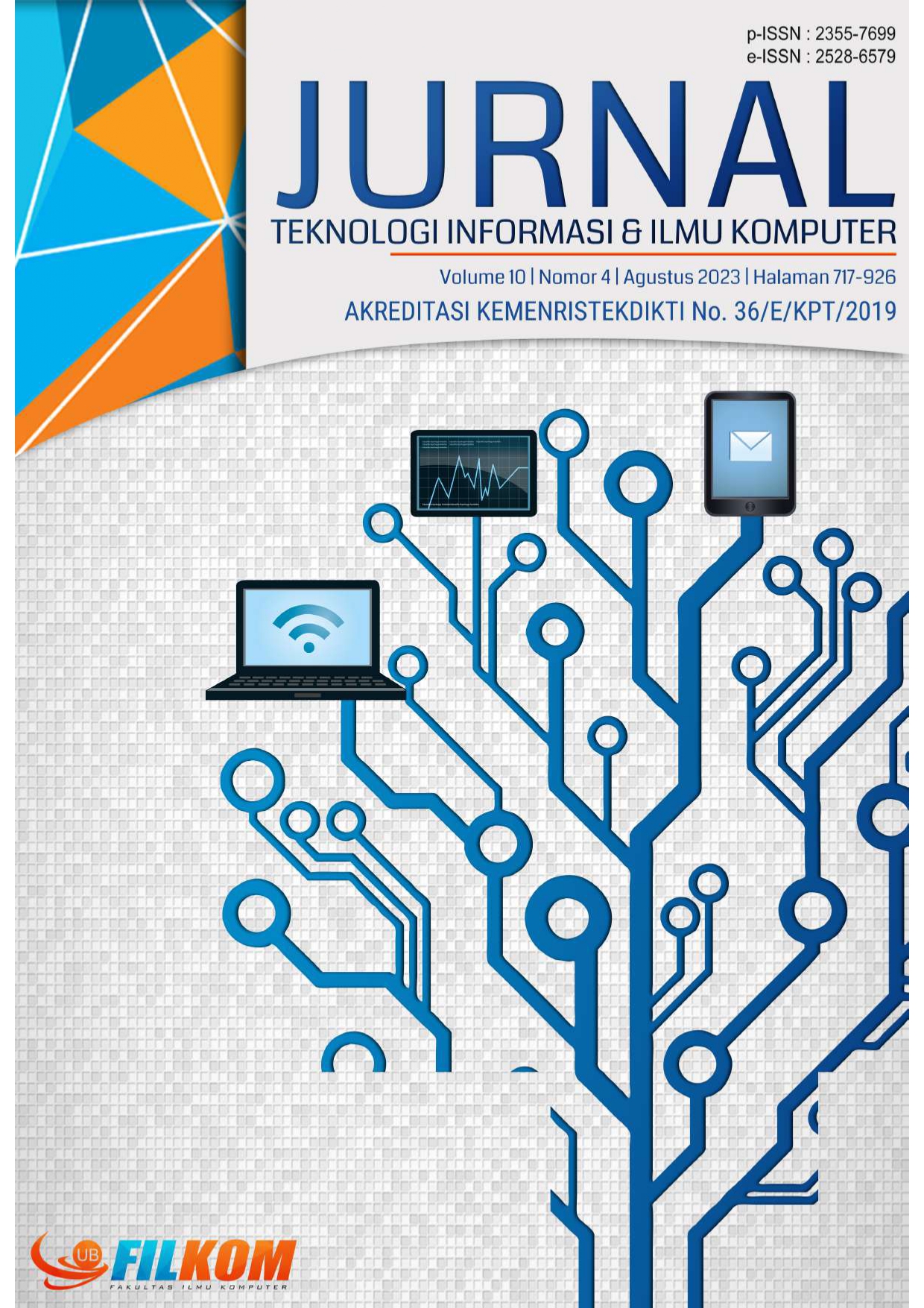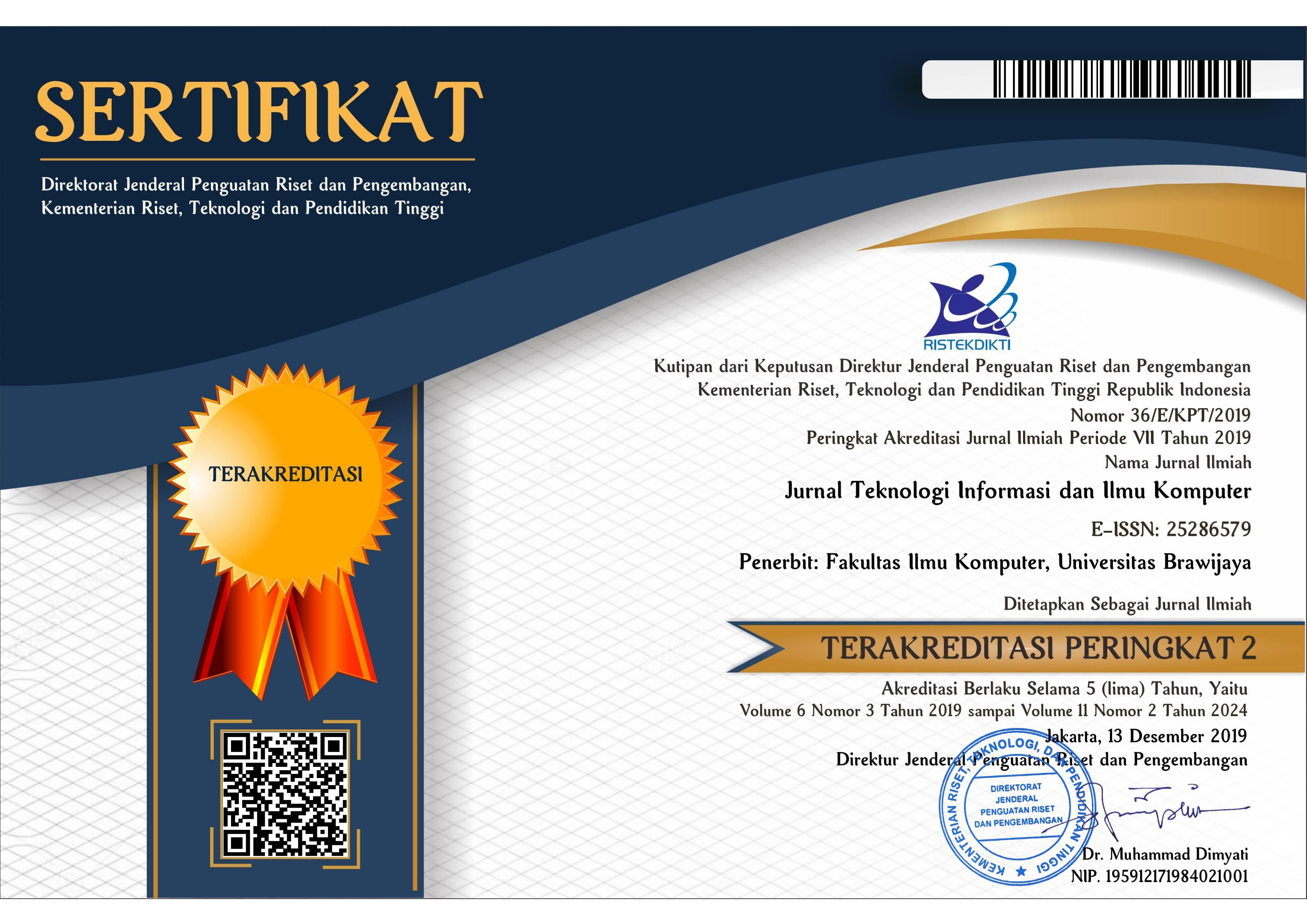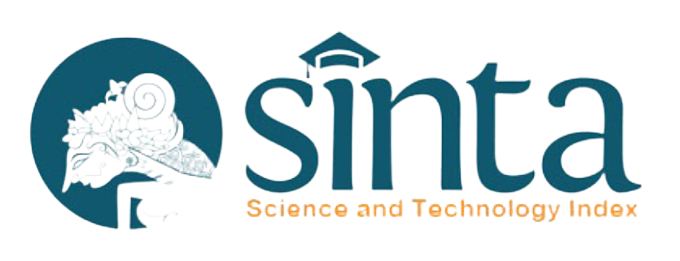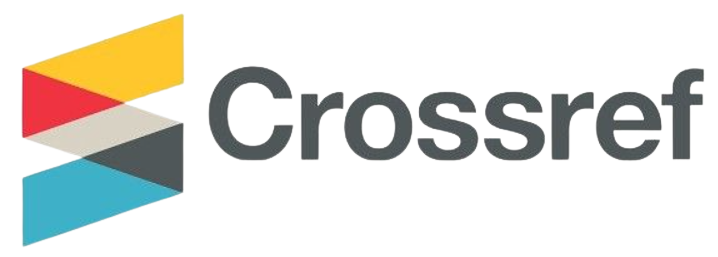Analisis Faktor Transformasi Digital Pelayanan Publik Pemerintah Di Era Pandemi
DOI:
https://doi.org/10.25126/jtiik.2023107059Abstrak
Banyak perubahan yang terjadi dalam kehidupan masyarakat sebagai konsekuensi dari social distancing di era pandemi. Hal ini juga mempengaruhi cara pelayanan publik pemerintah kepada masyarakat yang ikut berubah akibat pembatasan sosial, di mana pelayanan tatap muka ditiadakan dan digantikan oleh layanan virtual dengan memanfaatkan teknologi informasi. Digital Government Transformation adalah teori yang digunakan dalam penelitian ini untuk melihat faktor pendorong dan penghambat proses transformasi digital khususnya pada pelayanan publik di masa pandemi. Penelitian ini bertujuan mengidentifikasi faktor-faktor yang mendukung dan menghambat serta tantangan yang dialami Indonesia selama pandemi dalam digitalisasi pelayanan publik. Penelitian ini dianalisa menggunakan Structural Equation Modelling dengan pengambilan data melalui cross sectional survey pada 208 responden. Hasil penelitian dapat disimpulkan bahwa faktor yang mendorong keberhasilan proses digitalisasi pelayanan publik di masa pandemi adalah profesionalisme dalam melayani yang tergambar dari inovasi pelayanan publik, kemampuan sumber daya manusia, dan pengalaman kerja. Sementara itu, faktor penghambat dari perspektif organisasi dan budaya seperti kurangnya panduan kepemimpinan, kurangnya koordinasi antar divisi, kurangnya dukungan operasional, budaya yang menolak perubahan, dan birokrasi yang rumit belum terbukti secara signifikan mempengaruhi proses transformasi karena hambatan tersebut tidak dapat membendung transformasi digital pelayanan masyarakat ketika dihadapkan pada kondisi pandemi Covid-19 yang membutuhkan perubahan.
Abstract
Many changes have occurred in people’s lives as a consequence of social distancing in pandemic era. This also affects the way government public services to the community have changed due to social restrictions, where face-to-face services are abolished and replaced by virtual services by utilizing information technology. Digital Government Transformation is the theory used in this research to see the driving and inhibiting factors of the digital transformation process. This research investigates the factors that support and hinder along with the challenges experienced in Indonesia during the pandemic in the digitalization of public services. This study used a questionnaire survey and managed to collect 208 respondents. The results of the study can be concluded that the factors that drive the successful practice of public service’s digitalization during the pandemic are professionalism in serving which is depicted from public service innovations, human resource capabilities, and work experience. Meanwhile, the inhibiting factors from the organizational and cultural perspective as lack of leadership guidance, lack of coordination between divisions, lack of operational support, a culture that resists change, and complicated bureaucracy have not proven to significantly affect the transformation process because these obstacles cannot stem the digital transformation of public services when faced with the Covid-19 pandemic condition that requires change.
Downloads
Referensi
BOBAN, M., & KLARIC, M., 2021. Impact of Covid 19 Pandemic on Digital Transformation of Public Administration in European Union. 2021 44th International Convention on Information, Communication and Electronic Technology, MIPRO 2021 - Proceedings, 1312–1317. https://doi.org/10.23919/MIPRO52101.2021.9596678
BOUSDEKIS, A., & KARDARAS, D., 2020a. Digital transformation of local government: A case study from greece. Proceedings - 2020 IEEE 22nd Conference on Business Informatics, CBI 2020, 2, 131–140. https://doi.org/10.1109/CBI49978.2020.10070
BOUSDEKIS, A., & KARDARAS, D., 2020b. Digital transformation of local government: A case study from greece. Proceedings - 2020 IEEE 22nd Conference on Business Informatics, CBI 2020, 2, 131–140. https://doi.org/10.1109/CBI49978.2020.10070
CEPPARULO, A., & ZANFEI, A., 2021. The diffusion of public eServices in European cities. Government Information Quarterly, 38(2). https://doi.org/10.1016/j.giq.2020.101561
CHAWLA, Y., RADZIWON, A., SCARINGELLA, L., CARLSON, E. L., GRECO, M., SILVEIRA, P. D., DE AGUIAR, E. P., SHEN, Q., WILL, M., & KOWALSKA-PYZALSKA, A., 2021. Predictors and outcomes of individual knowledge on early-stage pandemic: Social media, information credibility, public opinion, and behaviour in a large-scale global study. Information Processing & Management, 58(6), 102720. https://doi.org/https://doi.org/10.1016/j.ipm.2021.102720
CORRALES-GARAY, D., ORTIZ-DE-URBINA-CRIADO, M., & MORA-VALENTIN, E.-M., 2020. A Research Agenda on Open Data Impact Process for Open Innovation. IEEE Access, 8, 34696–34705. https://doi.org/10.1109/ACCESS.2020.2974378
HAIR, J. F., RINGLE, C. M., & SARSTEDT, M., 2011. PLS-SEM: Indeed a silver bullet. Journal of Marketing Theory and Practice, 19(2), 139–152. https://doi.org/10.2753/MTP1069-6679190202
HANDAYANI, P. W., HIDAYANTO, A. N., SANDHYADUHITA, P. I., KASIYAH, & AYUNINGTYAS, D., 2015. Strategic hospital services quality analysis in Indonesia. Expert Systems with Applications, 42(6), 3067–3078. https://doi.org/10.1016/j.eswa.2014.11.065
HERMANTO, A., BINTI IBRAHIM, R., & KUSNANTO, G., 2020. Improving value-based e-government towards the achievement of smart government. 2020 5th International Conference on Informatics and Computing, ICIC 2020. https://doi.org/10.1109/ICIC50835.2020.9288609
KANKANHALLI, A., ZUIDERWIJK, A., & TAYI, G. K., 2017. Open innovation in the public sector: A research agenda. In Government Information Quarterly (Vol. 34, Issue 1, pp. 84–89). https://doi.org/10.1016/j.giq.2016.12.002
KEMENPANRB., 2021. Finalis Top Kompetisi Inovasi Pelayanan Publik.pdf.
KHALID, S. A., & LAVILLES, R. Q., 2019. Maturity assessment of local E-government websites in the Philippines. Procedia Computer Science, 161, 99–106. https://doi.org/10.1016/j.procs.2019.11.104
KITCHENHAM, B., & CHARTERS, S., 2007. Guidelines for performing Systematic Literature reviews in Software Engineering Version 2.3. Engineering, 45(4ve), 1051. https://doi.org/10.1145/1134285.1134500
KUTNJAK, A., 2021. Covid-19 Accelerates Digital Transformation in Industries: Challenges, Issues, Barriers and Problems in Transformation. IEEE Access, 9, 79373–79388. https://doi.org/10.1109/ACCESS.2021.3084801
MANSOOR, M., 2021. Citizens’ trust in government as a function of good governance and government agency’s provision of quality information on social media during COVID-19. In Government Information Quarterly (Vol. 38, Issue 4). https://doi.org/10.1016/j.giq.2021.101597
MERHI, M. I., 2021. Evaluating the critical success factors of data intelligence implementation in the public sector using analytical hierarchy process. Technological Forecasting and Social Change, 173(August), 121180. https://doi.org/10.1016/j.techfore.2021.121180
RB, K., 2021. Permenpan No. 7 Tahun 2021 Tentang Kompetisi Inovasi Pelayanan Publik. Angewandte Chemie International Edition, 6(11), 951–952., 5–24.
ROBALINO-LOPEZ, A., ANISCENKO, Z., AGUILAR, M., & ESPINEL, C., 2021. Following-up E-government performance in andean countries as development process. 2021 8th International Conference on EDemocracy and EGovernment, ICEDEG 2021, 55–65. https://doi.org/10.1109/ICEDEG52154.2021.9530975
ROGELEONICK, A., PURWANDARI, B., SATRIA, R., PURWANINGSIH, M., & KUMARALALITA, L., 2020. Factors Influencing the Community’s Intention to Participate in Public Services: The Perspective of the Ministry of Education and Culture. ACM International Conference Proceeding Series, 79–84. https://doi.org/10.1145/3387263.3387285
SHIN, S.-C., Ho, J.-W., & PAK, V. Y., 2020. Digital Transformation through e-Government Innovation in Uzbekistan. International Conference on Advanced Communication Technology, ICACT, 2020, 632–639. https://doi.org/10.23919/ICACT48636.2020.9061507
SHIN, S. C., HO, J. W., & PAK, V. Y., 2020. Digital Transformation through e-Government Innovation in Uzbekistan. International Conference on Advanced Communication Technology, ICACT, 2020, 632–639. https://doi.org/10.23919/ICACT48636.2020.9061507
SHIN, S. C., & RAKHMATULLAVEY, Z. M., 2019. Digital Transformation of the Public Service Delivery System in Uzbekistan. International Conference on Advanced Communication Technology, ICACT, 2019-Febru, 703–709. https://doi.org/10.23919/ICACT.2019.8702014
TANGI, L., JANSSEN, M., BENEDETTI, M., & NOCI, G., 2021. Digital government transformation: A structural equation modelling analysis of driving and impeding factors. International Journal of Information Management, 60(September 2020). https://doi.org/10.1016/j.ijinfomgt.2021.102356
TURBAN, E. a., 1999. Electronic commerce. In IETE Technical Review (Institution of Electronics and Telecommunication Engineers, India) (Vol. 16, Issues 3–4). https://doi.org/10.1080/02564602.1999.11416851
UPADHYAY, P., KUMAR, A., DWIVEDI, Y. K., & ADLAKHA, A., 2022. Continual usage intention of platform-based governance services: A study from an emerging economy. In Government Information Quarterly (Vol. 39, Issue 1). https://doi.org/10.1016/j.giq.2021.101651
VIAL, G., 2019. Understanding digital transformation: A review and a research agenda. Journal of Strategic Information Systems, 28(2), 118–144. https://doi.org/10.1016/j.jsis.2019.01.003
WAHYU SULISTYA, A. Q., BASTIAN SULISTIYO, B., ADITYA, F., ARITONANG, I. D., AMOS SIMANGUNSONG, S., SHIHAB, M. R., & RANTI, B., 2019. A case study of indonesian government digital transformation: Improving public service quality through E-government implementation. Proceedings - 2019 5th International Conference on Science and Technology, ICST 2019. https://doi.org/10.1109/ICST47872.2019.9166234
WONG, K. K. K.-K., 2013. 28/05 - Partial Least Squares Structural Equation Modeling (PLS-SEM) Techniques Using SmartPLS. Marketing Bulletin, 24(1), 1–32. http://marketing-bulletin.massey.ac.nz/v24/mb_v24_t1_wong.pdf%5Cnhttp://www.researchgate.net/profile/Ken_Wong10/publication/268449353_Partial_Least_Squares_Structural_Equation_Modeling_(PLS-SEM)_Techniques_Using_SmartPLS/links/54773b1b0cf293e2da25e3f3.pdf
Unduhan
Diterbitkan
Terbitan
Bagian
Lisensi

Artikel ini berlisensi Creative Common Attribution-ShareAlike 4.0 International (CC BY-SA 4.0)
Penulis yang menerbitkan di jurnal ini menyetujui ketentuan berikut:
- Penulis menyimpan hak cipta dan memberikan jurnal hak penerbitan pertama naskah secara simultan dengan lisensi di bawah Creative Common Attribution-ShareAlike 4.0 International (CC BY-SA 4.0) yang mengizinkan orang lain untuk berbagi pekerjaan dengan sebuah pernyataan kepenulisan pekerjaan dan penerbitan awal di jurnal ini.
- Penulis bisa memasukkan ke dalam penyusunan kontraktual tambahan terpisah untuk distribusi non ekslusif versi kaya terbitan jurnal (contoh: mempostingnya ke repositori institusional atau menerbitkannya dalam sebuah buku), dengan pengakuan penerbitan awalnya di jurnal ini.
- Penulis diizinkan dan didorong untuk mem-posting karya mereka online (contoh: di repositori institusional atau di website mereka) sebelum dan selama proses penyerahan, karena dapat mengarahkan ke pertukaran produktif, seperti halnya sitiran yang lebih awal dan lebih hebat dari karya yang diterbitkan. (Lihat Efek Akses Terbuka).















